
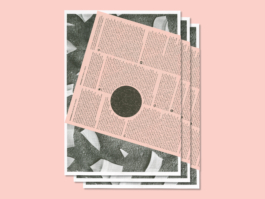



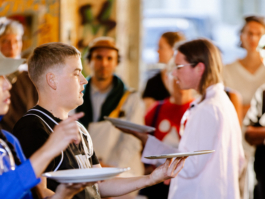

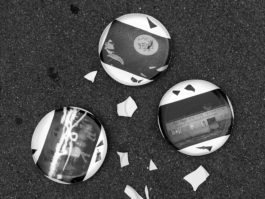

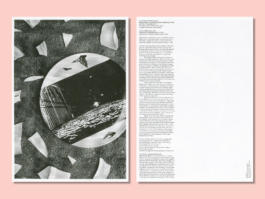


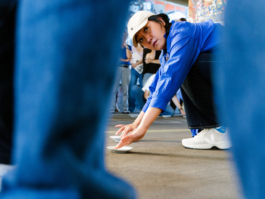


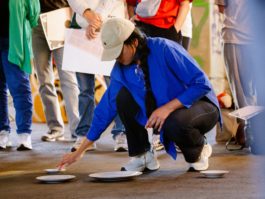

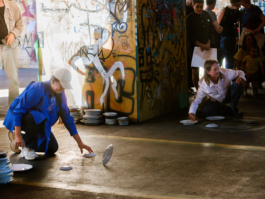
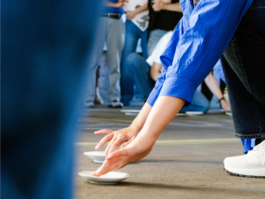
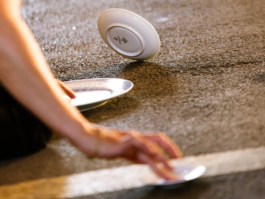
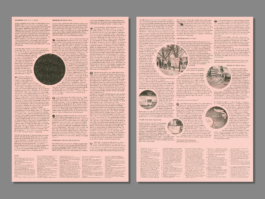



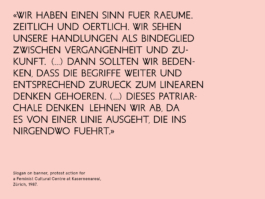

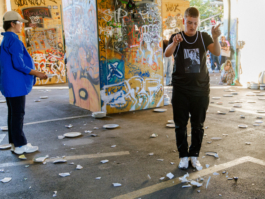



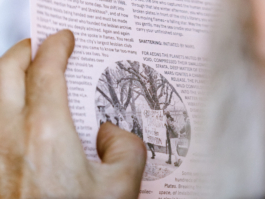
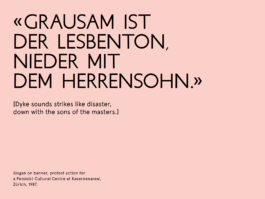
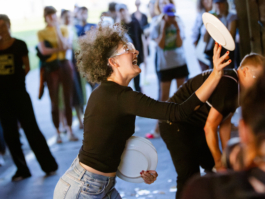
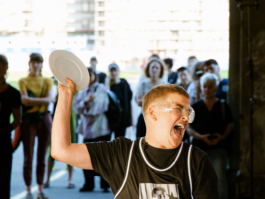


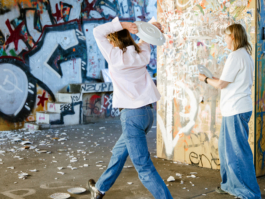
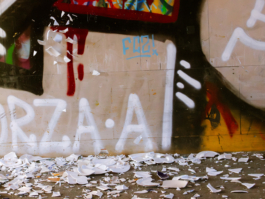
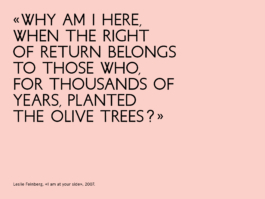
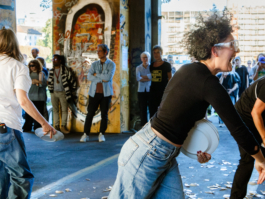
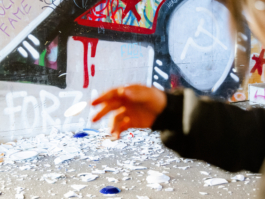

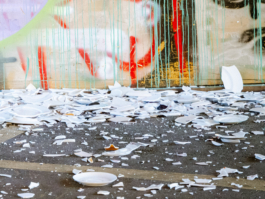
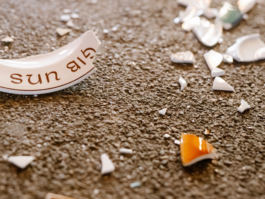
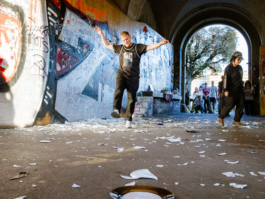
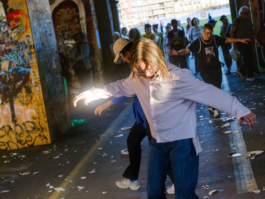


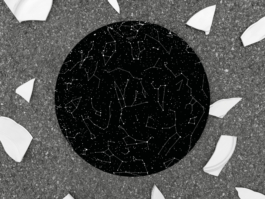

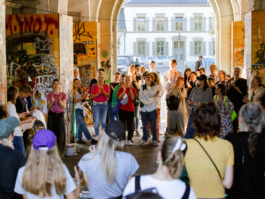


Images Performance: Noel Ortiz, Moritz Haase, 2025. Images Plates: Aio Frei, 2025.
sonic research/score/poem/composition/soundperformance
OTO Sound Museum presents:
Break/core – A composition in 6 constellations
Aio Frei & Franziska Koch
with Miao Zhao, Njomza Dragusha, Tristan Amor Rabit, Vivian Wang
20.09.2025,6 pm
Durchgang Kasernenareal
Zureich
The intervention is curated by Francesca Brusa, Zaira Oram.
OTO Sound
OTO Sound insta
Since that night, the earth will have rotated 13’629 times around its own axis. That night, the moon rose over the Kasernenareal at around 7:25 pm. You also had imagined an observatory on the roof, next to all the urgently needed spaces to continue your work. That full moon night, your collective fury broke forth as a piercing, shattering storm of sound.
«Grausam ist der Lesbenton, nieder mit dem Herrensohn.»
[Dyke sounds strikes like disaster, down with the sons of the masters.]
Slogan on a banner, protest action for a Feminist cultural centre at Kasernenareal, Zürich, 1987.
The military facilities of the Zürich Kasernenareal [barracks area] were built in 1876, a time of military expansion and imperialist encroachment on many regions of the world. To this day they remain a symbol of patriarchal power structures in Europe and of colonial fantasies of war and conquest, the politics that ultimately led to the First World War. In 1986 the military left the area in District 4 after roughly one hundred years. This prompted more than 30 feminist groups active in Zürich to join forces. They demanded that a «Frauenkulturzentrum» be established in two of the former armouries: «Kasernenraum, ein Lesbentraum». [barrack walls and beams these are lesbian dreams.] With activist actions and political campaigns, they made their claims for more space and urgently needed resources known.
«Unsere Zukunft oder keine.»
[Our future or none]
Slogan on a banner, protest action for a Feminist cultural centre at Kasernenareal, Zürich, 1987.
Today, some forty years later, emancipatory educational programmes are being cut back in favour of new armament, and anti-feminist, transphobic and racist policies are being enshrined in law. The human rights systems created after the First and Second World Wars have been blocked and hollowed out by the states that once installed them. Imperialism continues its patriarchal violence – through wars, oppression, internment camps, settler regimes and genocides.
«Why am I here, when the right of return belongs to those who, for thousands of years, planted the olive trees.»
Leslie Feinberg, «I am at your side», 2007.
Break/core refers to one of the political actions of the 1980s surrounding the demand for a Feminist Cultural Centre in Zürich. On the evening of 29 May 1988, after the city and canton had rejected their demands, several hundred feminists gathered in front of the barracks. In an angry protest, they smashed hundreds of plates: «Der Abwasch hat ein Ende.» [Washing dishes is over] In its energy, sounding and resonance, this action is emblematic for the long-standing, polyphonic and dissonant queer-feminist struggle for space, participation, self-determination and demilitarisation.
«We understand the meaning of spaces. In temporal and spatial terms. We see our actions as a link between the past and the future. (...) Then we should bear in mind that the concepts of «forward» and, correspondingly, «backward» belong to linear thinking. (...) We reject this patriarchal thinking because it is modelled on a line that leads nowhere.»
From «Flügelschläge – Ein Frauenkulturzentrum für Zürich», video essay, Videowerkstatt Frauenzimmer, 1987.
Based on archival materials held in public and private places, and conversations with activists who participated in the struggle for the Feminist Cultural Centre at the time, Aio and Franziska develop a multi-layered composition with plates. It deals with non-linear historiography and fractures in memory culture, with intersectional solidarity, self-organised queer-feminist work, the erotics of anger and dissonance, with mourning work and politics of friendship through planetary constellations. The resulting score poem is translated into an improvised live performance together with the artists Miao Zhao, Njomza Dragusha, Tristan Amor Rabit and Vivian Wang.
The intervention is curated by Francesca Brusa, Zaira Oram.
***
Composition/Score/Poem: Aio Frei & Franziska Koch
Performance: Aio Frei, Franziska Koch, Tristan Amor Rabit, Njomza Dragusha, Miao Zhao, Vivian Wang
Posterdesign & Riso-Print: Aio Frei
Printed Ceramics: Ursula Vogel
Documentation Performance: Noel Ortiz, Moritz Haase
Curated and organized: Francesca Brusa and Zaira Oram
We extend our deepest gratitude to:
Gabi Mengel, Mirjam Rudin, Gabriella Giacomin, Sibylle Dorn and Ursula Habersaat for their memory-work and for the generosity in sharing their personal recollections and archives, Romy Rüegger and Bettina Stehli for their hints, traces, contacts and door openers, Doro Röthlisberger and Gertrud Vogler for their photographic work, Francesca Brusa for the invitation and smooth cooperation, Alice Cantaluppi for the plate collection and for hosting us in the countryside, Ursula Vogel for last-minute printed ceramics, Suza Husse for last minute translation, Noel Ortiz and Moritz Haase for documentation, the Social Archive Zürich, and all those who fought before us for spaces of relationality, dissonance and solidarity.
***
Franziska Koch is an artist, sound performer, educator, improviser and organizer. She works on sound performances, sound translations, experimental exhibition and workshop formats based on collective, experience-based and improvisational practices. She is co-founder of the experimental record and art bookstore OOR Records and co-curates with Aio Frei OOR Saloon, a production context for queer-feminist listening practices. Franziska is a lecturer for artistic practice in the BA Fine Arts and the Soundminor at ZHdK. https://www.instagram.com/frenzy__k/
www.oor-rec.ch
Tristan Amor Rabit is an artist and researcher based between Berlin and Zurich. Working across media, their practice explores contemporary embodiment and the sensuality of the body, summoning spaces of mourning and ambiguity that emerge through shifting states and the inevitability of meaning. They are also co-initiator of thank you for the reminder, a loose collective dedicated to imagination, gathering and collective agency.
https://tristanamorrabit.com/
Njomza Dragusha is a community organizer, educator and researcher based between Zurich and Prishtina. Her practice focuses on transforming hierarchical structures into models of collective ownership—guided by intersectional feminist perspectives.
https://potpuri.org/Njomza-Dragusha
Miao Zhao is a musician, clarinetist born in China, based in Zürich. A performer known for her capricious and unpredictable artistic presence, she moves fluidly between various musical contexts—ranging from solo harsh noise performances to clarinetist in Swiss contemporary music ensembles, as well as projects situated within experimental, pop, ambient, new age, and other unclassifiable, interdisciplinary contemporary musical cultures. Her work is driven by a commitment to reimagining what it means to be a musician of today, fostering artistic practices that are autonomous, experimental, and culturally resonant. https://www.instagram.com/miao9556/
Vivian Wang is a composer, sound artist and musician, creating works across a range of intersections in art, culture and space. She is a founding member of experimental rock group The Observatory and has performed as a noise and improv musician since 2001. Using environmental sounds, field recording and elemental approaches, Vivian has developed durational works for expanded media and interactive installations. vivianwang.net
***
Zaira Oram is a curatorial collective engaged in experimental displays across visual arts, performance, sound, and data. Zaira Oram is composed by Francesca Ceccherini, Chloé Dall’Olio, Camille Regli, Francesca Brusa, and Elisa Bernardoni, and she expands to include other practitioners along her path. Her work weaves the themes of memory and identity, marginalization and resistance, rituality and healing with artistic processes. Among her other projects: Eart_ض (Switzerland/ Morocco, 2024), Observatory on Deculturalisation (Oxyd Winterthur, 2023), DOOM DOOM DOOM, notes from the planetary garden (Klang Moor Schopfe, Gais, 2023), A Symphony of Archives, Abdellah Hassak (Sonic Matter, Zurich, 2022), Derrière la mer, Anna Raimondo (Casino Luxembourg, Forum pour l’Art Contemporain, Luxembourg, 2022), and more.
Zaira Oram for OTO SOUND MUSEUM
Curator program 2025: Francesca Brusa and Francesca Ceccherini
Data curator and digital management: Elisa Bernardoni
Social media manager: Chloé Dall’Olio
Public relation: Camille Regli
Visual, video and photography: Axel Crettenand
Web development: Woodoo studio
Fundraising: Camille Jamet, HER Production
Press: Camille Regli
OTO SOUND MUSEUM is a nomadic space dedicated to fostering sound experimentation and amplifying voices. Founded with the mission of producing, disseminating, and collecting recent or unpublished sound works, the museum invites contemporary artists from different backgrounds, geographies and generations. Iconoclastic in nature, the museum was born digitally in 2020 as a utopian architecture aiming to host sound exhibitions accessible on this platform from all over the world. Simultaneously, OTO SOUND MUSEUM migrates through different places in the urban context of Switzerland and beyond, transforming its identity along the way. Among its objectives is the regeneration and interrogation of residual spaces of historical relevance through performative and installative interventions.
Images Ceramic Plates: Aio Frei, 2025. Ceramics: Ursula Vogel.
Historical images on plates: From «Frau und Raum», Exhibition Catalogue, Photographer unknown, Zürich, 1989.
Constellation Zürich night sky, May 29, 1988.
Excerpt of image, «Mir Fraue sind gnueg abgschpise worde, serviert eus es Frauekulturzentrum» , May 29, 1988. Photo: Doro Röthlisberger, Sozialarchiv Zürich.
«Fackelzug» um Kasernenareal für Frauenkulturzentrum, Zürich, 1988. Photo: Doro Röthlisberger, Sozialarchiv Zürich.